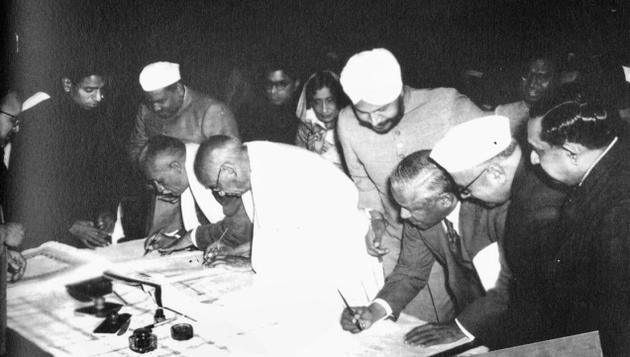By Baldev Raj Dawar
Want the Indian society corruption-free?
Curtail the powers of the Indian State. Change the function of the government – from ruling the people to serving the people.
People are not born corrupt. Indians are no scoundrels by nature. It is the governmental system that breeds corruption. In fact, the Indian Constitution bestows on the State too many draconian powers, without spelling out the services the State should be rendering to the people. The very tone and tenure of the Constitution is authoritarian: “There shall be a President of India.” and “It shall be the duty of every citizen of India” and so on.
The Constitution elaborately describes the powers of the State and its various organs and officers. It is silent about State’s obligations and duties in providing essential services to people.
Art.245 empowers the Parliament and the State Legislatures to make laws on all sorts of matters enumerated in the 7th Schedule. Starting with ‘Defence of India’ about 210 matters have been enumerated in three lists. You may say that there can be countless other matters which are not specifically listed in the 7th Schedule and think that they must be outside the power of the all-powerful Indian State to legislate on them.
You would be wrong.
Clauses 2 and 4 of Art. 246 and item No.97 of the Union List proclaim that Parliament has powers to make laws with respect to any matter for any part of the territory of India even if it is not enumerated in any of the lists. In other words, sky is the limit to the Parliament’s power to legislate.
You may further ask, what if a matter falls outside the territory of India, for example: monsoon, moonshine, tidal waves, trade winds, spectrum of cosmic radiation. Does the Indian State’s power extend to these uncharted territories?
The answer is in clause 2 of article 245 which reads: “No law made by Parliament shall be deemed to be invalid on the ground that it would have extra-territorial operation.” In other words, the jurisdiction of the Indian Parliament’s power to legislate is co-terminus with the Universe.
Where is the space and the scope left for the exercise of people’s rights and their control over their destinies? You may say a number of Fundamental Rights have been enshrined in Part III of the Constitution. A reading of that Part will sadly reveal that none of the enumerated Rights are unconditional. In fact the entire Part, like rest of the Constitution, elaborately describes only the powers of the Parliament to impose restrictions on the enumerated rights. Again, there do exist countless rights of the people which are not listed, for example, to shave or not to shave one’s head. These unmentioned rights are called ‘residual rights’.
What is the status of these residual rights in the Indian Constitution?
None.
You cannot claim any human, individual, social, ethical or aesthetic right if it is not enumerated in the Constitution. Contrast this with the Constitution of the United States, wherein all the enumerated rights are unconditional and the residual rights belong to the people and not to the State.
Most of the 105 and odd amendments made to the Constitution in the last 60 years had the effect of increasing the powers of the State and tightening its stranglehold over the people. The 42nd Amendment, for instance, diluted property rights and had the effect of extending the parliament’s powers in amending the constitution; along with introducing a set of non-justiciable Fundamental Duties that almost ask the citizen to worship the state.
Contrast this with the 27 amendments in the US constitution in the last 240 years. Just to take a couple, the 2nd Amendment guarantees the right of individuals to possess weapons, and the 22nd limits a president to two terms in office. The amendments to the US constitution define and extend freedom to the people, along with curtailing the powers of the government.
The unlimited powers bestowed on the Indian State by our Constitution and the stringent duties imposed on the hapless people breed corruption. It is the power that corrupts. Take away these powers, loosen the controls and free the people and the Indian society will be corruption free and people will prosper.
It is admittedly very difficult to define corruption, much more to assign any numerical values to the index of corruption in a given society. We can, however, easily gauge the levels of economic growth, freedom, well-being and prosperity in certain given societies.
- The least governed state, the United States of America, vs. the most governed state, the Soviet Union, in the 20th Century;
- West Germany vs. East Germany in fifties, sixties and seventies;
- 30 years of Mao ruled China vs. 30 years of Deng’s liberalized China; and
- 40 years of Nehruian centrally planned socialistic economy and 20 years of Manmohanian liberalized economy.
The results in terms of economic development, prosperity and well being are well known. We must, therefore, take lessons from the results of these historical cases. We must amend the Constitution and change the character of the State. We must replace the government that rules by a government that serves.
Baldev Raj Dawar is a retired Indian Diplomat. He worked in the Foreign Service till 1989 and is now a freelance journalist and author.
Post Disclaimer
The opinions expressed in this essay are those of the authors. They do not purport to reflect the opinions or views of CCS.






